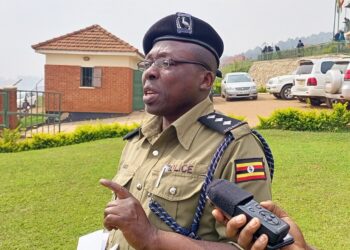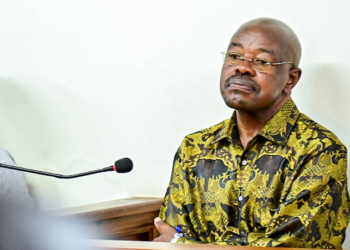In October, 35-year-old Jessica Nabongo became the first black woman to visit every country in the world—that is, 195 total UN member countries and observing states, including the Vatican and Palestine. For two-and-a-half years, Nabongo, who grew up in Detroit and holds both an American and Ugandan passport, documented her journey via her massively popular Instagram account and blog, Catch Me If You Can. Her journey’s taken her diving off the coast of Colombia, exploring Buddhist pagodas in Burma, and private jetting to Art Basel in Miami.
In the overwhelmingly white travel blogging industry, Nabongo’s achievement is even more significant in terms of representation—something she doesn’t take for granted. And beyond advocating for equitable representation, Nabongo has used her platform to educate her followers about ethical travel, condemn racism and xenophobia, and promote self-care for a busy lifestyle. We caught up with Nabongo to see what she learned during her world tour.
When did you know you wanted to travel to every single country in the world?
I’ve been interested for a very long time—I’ve always been a huge geography nerd. I always said I’d do it by my 40th birthday. Then in 2017, I decided I would do it by October 2019, by the time I was 35.
What was the hardest country to visit, if any?
Then there are countries in conflict, like Syria, Yemen, and Afghanistan. Thankfully, people in the country counting community are generous—they want to share resources, they want to connect you to a local fixer. I didn’t find it particularly difficult because of the community. And in the case of North Korea, I was able to travel there on my Ugandan passport.
Every experience looked incredible on your Instagram—but were there any tough moments behind the scenes? And how did you overcome them?
I’ll tell you about an experience I had in Mali. Mali is amazing. They have an extensive history and literature—obviously Timbuktu, but also the textile and art and music. So I planned to spend six days there. But when I arrived, I couldn’t really find drivers, and it was hard to get around so I got really frustrated. I thought to myself, “Why am doing this? This is awful.” I mean, it’s hard being on the road traveling countries without tourism infrastructure, and it’s even harder doing it solo. I speak French, but not enough that it wasn’t mentally exhausting.
But I eventually linked up with a photographer in Bamoko, the capital. He introduced me to some guys at the local market and told them what I was doing. At first they were like, “What?!” but then they got so excited. That moment was so beautiful—these strangers in the market who were so supportive. That, for me, was a turning point this year. Mali was country 165 so I had quite a bit of a way to go. Every day, I think about them and it motivates me.
To travel just means to leave your home. You don’t need to go halfway across the world. You can travel a hundred miles from your home—got to a new city in your state, or go to the next state over
Do you think it’s realistic for folks to try to do what you’ve done?
Figure out why you are feeling the desire to travel. I think part of the obsession these days is this narrative on social media about quitting your job, traveling the world, and being a digital nomad. It’s not the best way forward for the vast majority of people. I don’t think everyone needs to travel full-time. It’s super exhausting. At the same time, travel teaches you many things and helps you grow in a lot of ways.
What advice would you give to people who simply want to travel more?
To travel just means to leave your home. You don’t need to go halfway across the world. You can travel a hundred miles from your home—got to a new city in your state, or go to the next state over. I look forward to visiting the rest of the US. I have 15 states left. But the same question applies: Why do you want to travel? How do you consume culture? Answering these questions will help with the experiences you end up having. For me, it’s because I was always very curious about daily life and culture. I wanted to see mundane things that people did every day in different cultural contexts.
And of course travel is costly. But if you just want to see new places and aren’t as picky, chase the deal not the destination. When you see deals, take them—no matter where. You can’t just be like, “I want to go to Brazil in the middle of summer for Carnaval.” You’re limiting yourself that way.
Any words of wisdom for solo female travelers?
For that first solo trip, choose somewhere you’re going to be comfortable, where there’s going to be some kind of familiar reference point. Whether that’s language, Westernization, or just something on the beaten path—when you’re comfortable, you’re confident. When you’re confident, you won’t be as vulnerable. You don’t want to be in a place where you’re not comfortable and you look anxious walking down the street.
When you’re confident, you won’t be as vulnerable. You don’t want to be in a place where you’re not comfortable and you look anxious walking down the street.
What was your favorite cuisine that you discovered during your travels?
Georgia has amazing food. It blew me away. I didn’t necessarily expect it. I had eaten Georgian food in Kiev, so I knew it was good. But when I got there, it was next-level good. It’s also the birthplace of wine. All of that together made for one of my favorite culinary experiences in a country. Ethiopia, Senegal, Trinidad and Tobago were also in my top ten countries for food.
Do you feel that traveling is harder for you as a black woman?
People often ask me, as a black woman, which countries are the best for black people to visit? I understand where it’s coming from. I think it’s misplaced. I’m black and I’ve visited every country in the world. There’s not any country I’ve been to where I think “no black person should go there.”
If I do have a negative experience, I stop and think: Was it because I’m black? Just because I have a negative experience doesn’t mean it’s because I’m black. Have there been some? Absolutely. Beyond being black, I’m visibly African. I have issues with immigration—either they don’t believe my American passport is real or if I’m using my Ugandan passport, there’s issues because it’s African. I’m very dark, I have short hair, and I usually wear red lipstick. Even people in the US stare at me sometimes.
In Central Asia, the staring was the worst. In Uzbekistan, everyone was staring. In India, people were trying to take pictures with me. I was like, “You’re at the Taj Mahal!” With regards to being black, sure, in homogenous places, people stare at you more. But at the same time, some of the places I hated have been favorites for some of my black friends. We have to be careful of the danger of a single story.
Finally, the way black people suffer in the US is unlike any places I’ve ever been. I’ve been held at gunpoint by police officer in Miami. The chances of that happening anywhere else in the vast, vast majority of world—maybe 191 countries—is pretty slim.
What’s on your schedule now that you’ve finished the journey?
See so many people I love. SLEEP. Not sure where I’ll be sleeping, but sleep for sure. I’m sure that’ll be in multiple places. It’s pretty rare for me to not get on a plane after a month of rest. I’m still going to be traveling. I recently launched ‘The Catch’, which is an ’m also looking to forward to launching my e-commerce site where I sell market finds that I handpick in markets around the world and relaunched my boutique travel agency, Jet Black, through which I host trips to my favorite countries. First up is Jordan in April 2020. project.
Reuters
Do you have a story in your community or an opinion to share with us: Email us at editorial@watchdoguganda.com











